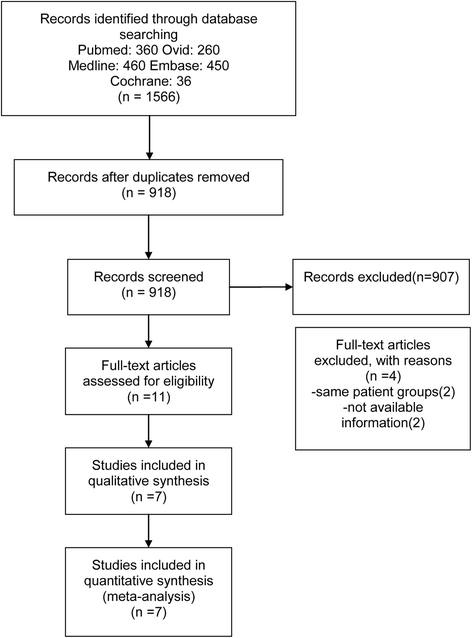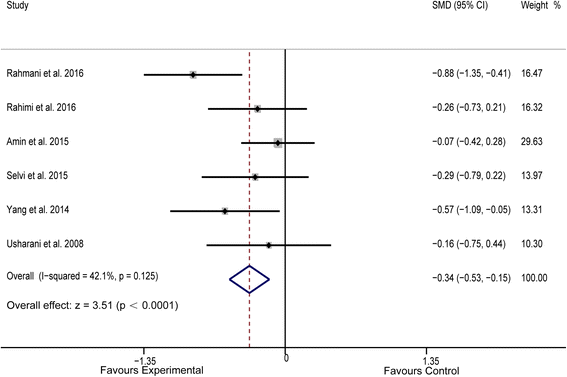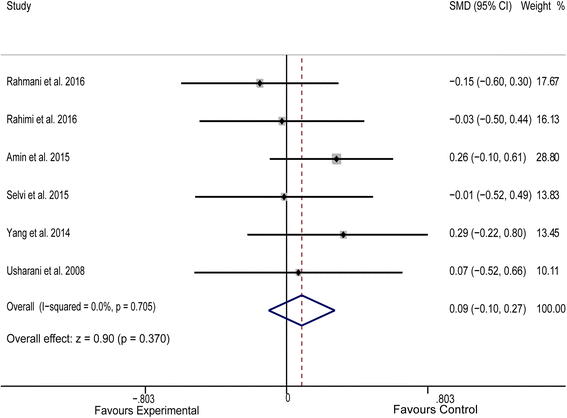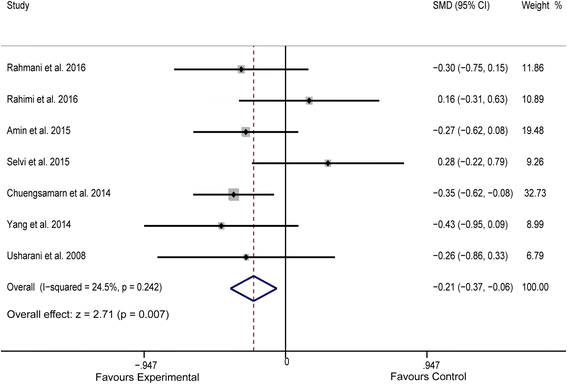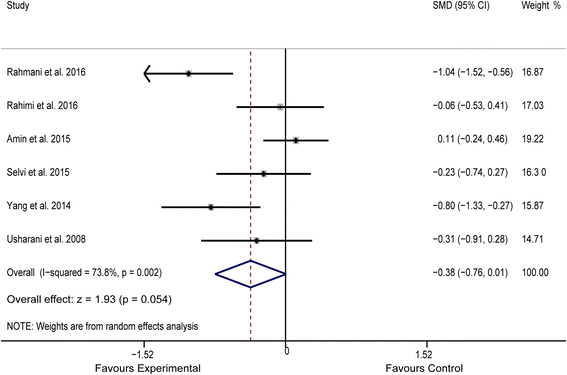Efficacy and safety of turmeric and curcumin in lowering blood lipid levels in patients with cardiovascular risk factors: a meta-analysis of randomized controlled trials - PubMed (original) (raw)
Review
Efficacy and safety of turmeric and curcumin in lowering blood lipid levels in patients with cardiovascular risk factors: a meta-analysis of randomized controlled trials
Si Qin et al. Nutr J. 2017.
Abstract
Background: Dyslipidemia is an important and common cardiovascular risk factor in the general population. The lipid-lowering effects of turmeric and curcumin are unconfirmed. We performed a meta-analysis to assess the efficacy and safety of turmeric and curcumin in lowering blood lipids in patients at risk of cardiovascular disease (CVD).
Methods: A comprehensive literature search was conducted on PubMed, Embase, Ovid, Medline and Cochrane Library databases to identify randomized controlled trials (published as of November 2016) that assessed the effect of turmeric and curcumin on blood lipid levels including total cholesterol (TC), low-density lipoprotein cholesterol (LDL-C), high-density lipoprotein cholesterol (HDL-C), and triglycerides (TG). Pooled standardized mean difference (SMD) with 95% confidence interval (CI) was used to assess the effect.
Results: The analysis included 7 eligible studies (649 patients). Turmeric and curcumin significantly reduced serum LDL-C (SMD = -0.340, 95% confidence interval [CI]: -0.530 to -0.150, P < 0.0001) and TG (SMD = -0.214, 95% CI: -0.369 to -0.059, P = 0.007) levels as compared to those in the control group. These may be effective in lowering serum TC levels in patients with metabolic syndrome (MetS, SMD = -0.934, 95% CI: -1.289 to -0.579, P < 0.0001), and turmeric extract could possibly have a greater effect on reducing serum TC levels (SMD = -0.584, 95% CI: -0.980 to -0.188, P = 0.004); however, the efficacy is yet to be confirmed. Serum HDL-C levels were not obviously improved. Turmeric and curcumin appeared safe, and no serious adverse events were reported in any of the included studies.
Conclusions: Turmeric and curcumin may protect patients at risk of CVD through improving serum lipid levels. Curcumin may be used as a well-tolerated dietary adjunct to conventional drugs. Further research is required to resolve uncertainties related to dosage form, dose and medication frequency of curcumin.
Keywords: Cardiovascular risk; Cholesterol; Curcumin; Meta-analysis; Triglycerides; Turmeric.
Conflict of interest statement
Ethics approval and consent to participate
Not applicable.
Consent for publication
Not applicable.
Competing interests
The authors declare that they have no competing interests.
Publisher’s Note
Springer Nature remains neutral with regard to jurisdictional claims in published maps and institutional affiliations.
Figures
Fig. 1
Flow diagram of the literature selection process
Fig. 2
Forest plot of the meta-analysis for comparison of plasma LDL-C concentrations between experimental and control groups
Fig. 3
Forest plot of the meta-analysis for comparison of plasma HDL-C concentrations between experimental and control groups
Fig. 4
Forest plot of the meta-analysis for comparison of plasma TG concentrations between experimental and control groups
Fig. 5
Forest plot of the meta-analysis for comparison of plasma TC concentrations between experimental and control groups
Similar articles
- A systematic review and meta-analysis of randomized controlled trials investigating the effects of curcumin on blood lipid levels.
Sahebkar A. Sahebkar A. Clin Nutr. 2014 Jun;33(3):406-14. doi: 10.1016/j.clnu.2013.09.012. Epub 2013 Sep 25. Clin Nutr. 2014. PMID: 24139527 Review. - Curcuminoids modify lipid profile in type 2 diabetes mellitus: A randomized controlled trial.
Panahi Y, Khalili N, Sahebi E, Namazi S, Reiner Ž, Majeed M, Sahebkar A. Panahi Y, et al. Complement Ther Med. 2017 Aug;33:1-5. doi: 10.1016/j.ctim.2017.05.006. Epub 2017 May 29. Complement Ther Med. 2017. PMID: 28735818 Clinical Trial. - Effects of curcumin/turmeric supplementation on lipid profile: A GRADE-assessed systematic review and dose-response meta-analysis of randomized controlled trials.
Dehzad MJ, Ghalandari H, Amini MR, Askarpour M. Dehzad MJ, et al. Complement Ther Med. 2023 Aug;75:102955. doi: 10.1016/j.ctim.2023.102955. Epub 2023 May 23. Complement Ther Med. 2023. PMID: 37230418 Review. - A Systematic Review and Meta-analysis of Randomized Controlled Trials on the Effects of Turmeric and Curcuminoids on Blood Lipids in Adults with Metabolic Diseases.
Yuan F, Dong H, Gong J, Wang D, Hu M, Huang W, Fang K, Qin X, Qiu X, Yang X, Lu F. Yuan F, et al. Adv Nutr. 2019 Sep 1;10(5):791-802. doi: 10.1093/advances/nmz021. Adv Nutr. 2019. PMID: 31212316 Free PMC article. - Targeting low HDL-cholesterol to decrease residual cardiovascular risk in the managed care setting.
Cziraky MJ, Watson KE, Talbert RL. Cziraky MJ, et al. J Manag Care Pharm. 2008 Oct;14(8 Suppl):S3-28; quiz S30-1. J Manag Care Pharm. 2008. PMID: 19891279 Review.
Cited by
- The Effect of Curcumin on Reducing Atherogenic Risks in Obese Patients with Type 2 Diabetes: A Randomized Controlled Trial.
Yaikwawong M, Jansarikit L, Jirawatnotai S, Chuengsamarn S. Yaikwawong M, et al. Nutrients. 2024 Jul 26;16(15):2441. doi: 10.3390/nu16152441. Nutrients. 2024. PMID: 39125322 Free PMC article. Clinical Trial. - A descriptive study of commercial herbal dietary supplements used for dyslipidemia-Sales data and suspected adverse reactions.
Allkanjari O, Menniti-Ippolito F, Ippoliti I, Di Giacomo S, Piccioni T, Vitalone A. Allkanjari O, et al. Phytother Res. 2022 Jun;36(6):2583-2604. doi: 10.1002/ptr.7473. Epub 2022 May 7. Phytother Res. 2022. PMID: 35524700 Free PMC article. - Nano-curcumin improves glucose indices, lipids, inflammation, and Nesfatin in overweight and obese patients with non-alcoholic fatty liver disease (NAFLD): a double-blind randomized placebo-controlled clinical trial.
Jazayeri-Tehrani SA, Rezayat SM, Mansouri S, Qorbani M, Alavian SM, Daneshi-Maskooni M, Hosseinzadeh-Attar MJ. Jazayeri-Tehrani SA, et al. Nutr Metab (Lond). 2019 Jan 28;16:8. doi: 10.1186/s12986-019-0331-1. eCollection 2019. Nutr Metab (Lond). 2019. PMID: 30705687 Free PMC article. - Turmeric and Curcumin: From Traditional to Modern Medicine.
Akaberi M, Sahebkar A, Emami SA. Akaberi M, et al. Adv Exp Med Biol. 2021;1291:15-39. doi: 10.1007/978-3-030-56153-6_2. Adv Exp Med Biol. 2021. PMID: 34331682 - Daily White kwao krua dietary supplement alleviates LDL oxidative susceptibility, plasma LDL level and improves vasculature in a hypercholesterolemia rabbit model.
Ratanachamnong P, Phivthong-Ngam L, Namchaiw P. Ratanachamnong P, et al. J Tradit Complement Med. 2020 May 12;10(5):496-503. doi: 10.1016/j.jtcme.2020.05.001. eCollection 2020 Sep. J Tradit Complement Med. 2020. PMID: 32953566 Free PMC article.
References
- World Health Organization: The Top 10 Causes of Death. http://www.who.int/mediacentre/factsheets/fs310/en/index4.html (2014). Accessed 20 Nov 2016.
Publication types
MeSH terms
Substances
LinkOut - more resources
Full Text Sources
Other Literature Sources
Medical
Miscellaneous
